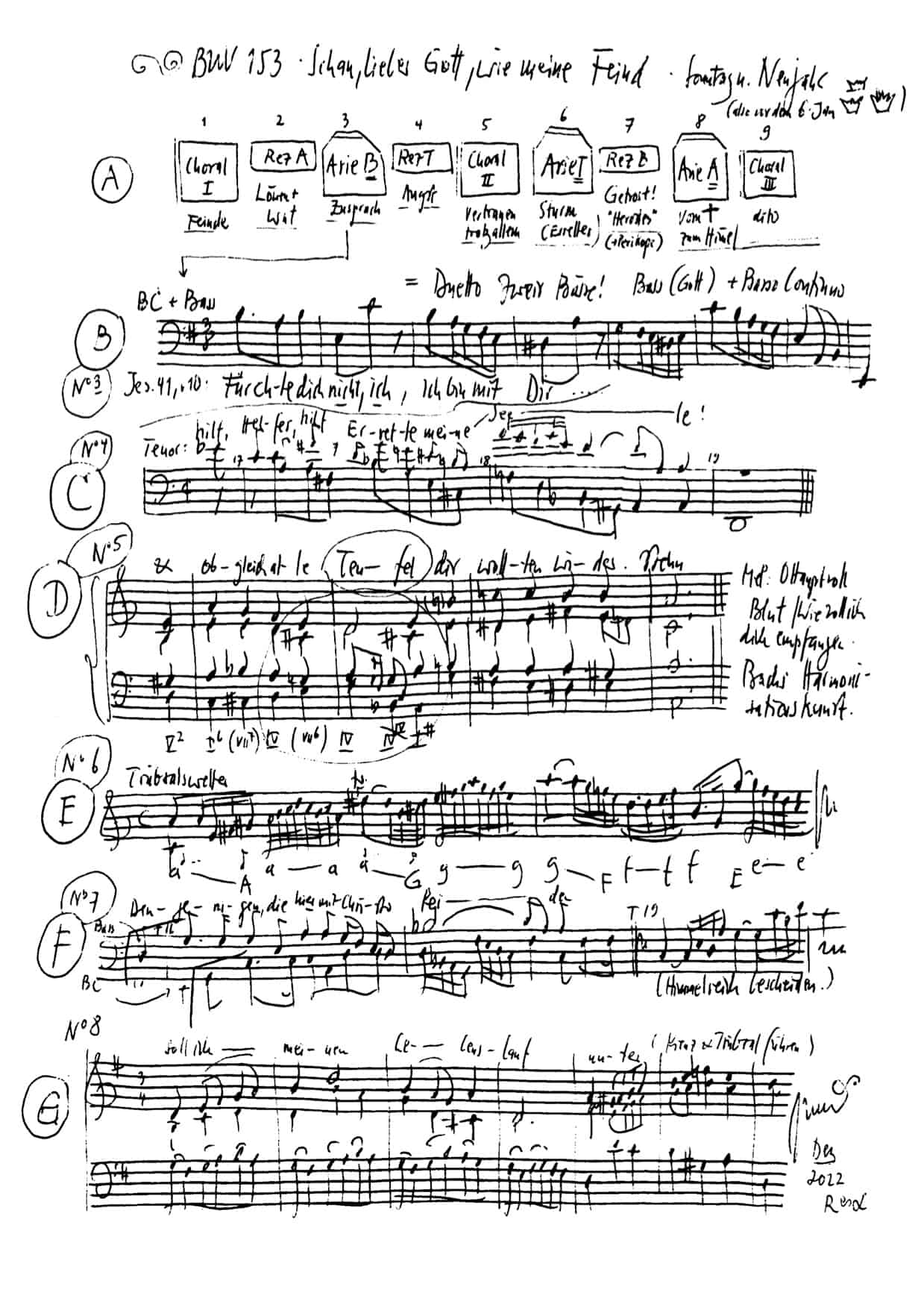
Schau, lieber Gott, wie meine Feind
BWV 153 // For the Sunday after New Year’s Day
(Behold, dear God, how all my foes) for alto, tenor and bass, vocal ensemble, strings and basso continuo

Place of composition in the church year
Pericopes for Sunday
Pericopes are the biblical readings for each Sunday and feast day of the liturgical year, for which J. S. Bach composed cantatas. More information on pericopes. Further information on lectionaries.
Meine Seele ist stille zu Gott, der mir hilft. Denn er ist mein Hort, meine Hilfe, mein Schutz, dass mich kein Fall stürzen wird, wie gross er ist. – Bei Gott ist mein Heil, meine Ehre, der Fels meiner Stärke; meine Zuversicht ist auf Gott. Hoffet auf ihn allezeit, liebe Leute, schüttet euer Herz vor ihm aus; Gott ist unsre Zuversicht.
Ihr Lieben, lasset euch die Hitze, so euch begegnet, nicht befremden (die euch widerfährt, dass ihr versucht werdet), als widerführe euch etwas Seltsames; sondern freuet euch, dass ihr mit Christo leidet, auf dass ihr auch zur Zeit der Offenbarung seiner Herrlichkeit Freude und Wonne haben möget. Selig seid ihr, wenn ihr geschmäht werdet über dem Namen Christi; denn der Geist, der ein Geist der Herrlichkeit und Gottes ist, ruht auf euch. Bei ihnen ist er verlästert, aber bei euch ist er gepriesen. Niemand aber unter euch leide als ein Mörder oder Dieb oder Übeltäter oder der in ein fremdes Amt greift. Leidet er aber als ein Christ, so schäme er sich nicht; er ehre aber Gott in solchem Fall. Denn es ist Zeit, dass anfange das Gericht an dem Hause Gottes. So aber zuerst an uns, was will’s für ein Ende werden 61 mit denen, die dem Evangelium Gottes nicht glauben? Und so der Gerechte kaum erhalten wird, wo will der Gottlose und Sünder erscheinen? Darum, welche da leiden nach Gottes Willen, die sollen ihm ihre Seelen befehlen als dem treuen Schöpfer in guten Werken. Oder 1. Petrus 3, 20–22: Gottes Geduld zur Zeit Noahs In demselben [im Geist] ist er [Christus] auch hingegangen und hat gepredigt den Geistern im Gefängnis, die vorzeiten nicht glaubten, da Gott harrte und Geduld hatte zu den Zeiten Noahs, da man die Arche zurüstete, in welcher wenige, das ist acht Seelen, gerettet wurden durchs Wasser; welches nun auch uns selig macht in der Taufe, die durch jenes bedeutet ist, nicht das Abtun des Unflats am Fleisch, sondern der Bund eines guten Gewissens mit Gott durch die Auferstehung Jesu Christi, welcher ist zur Rechten Gottes in den Himmel gefahren, und sind ihm untertan die Engel und die Gewaltigen und die Kräfte.
Da sie aber hinweggezogen waren, siehe, da erschien der Engel des Herrn dem Joseph im Traum und sprach: «Stehe auf und nimm das Kindlein und seine Mutter zu dir und flieh nach Ägyptenland. Und bleib allda, bis ich dir sage; denn es ist vorhanden, dass Herodes das Kindlein suche, dasselbe umzubringen.» Und der stand auf und nahm das Kindlein und seine Mutter zu sich bei der Nacht und entwich nach Ägyptenland. Und blieb allda bis nach dem Tod des Herodes, auf dass erfüllet würde, was der Herr durch den Propheten gesagt hat, der da spricht: «Aus Ägypten habe ich meinen Sohn gerufen.» Da Herodes nun sah, dass er von den Weisen betrogen war, ward er sehr zornig und schickte aus und liess alle Kinder zu Bethlehem töten und an seinen Grenzen, die da zweijährig und darunter waren, nach der Zeit, die er mit Fleiss von den Weisen erlernt hatte. Da ist erfüllt, was gesagt ist von dem Propheten Jeremia, der da spricht: «Auf dem Gebirge hat man ein Geschrei gehört, viel Klagens, Weinens und Heulens; Rahel beweinte ihre Kinder und wollte sich nicht trösten lassen, denn es war aus mit ihnen.» Da aber Herodes gestorben war, siehe, da erschien der Engel des Herrn dem Joseph im Traum in Ägyptenland und sprach: «Steh auf und nimm das Kindlein und seine Mutter zu dir und zieh hin in das Land Israel; sie sind gestorben, die dem Kinde nach dem Leben standen.» Und er stand auf und nahm das Kindlein und seine Mutter zu sich und kam in das Land Israel. Da er aber hörte, dass Archelaus im jüdischen Lande König war anstatt seines Vaters Herodes, fürchtete er sich, dahin zu kommen. Und im Traum empfing er Befehl von Gott und zog in die Örter des galiläischen Landes und kam und wohnte in der Stadt, die da heisst Nazareth; auf dass erfüllet würde, was da gesagt ist durch die Propheten: «Er soll Nazarenus heissen.»
Would you like to enjoy our videos ad-free? Subscribe to YouTube Premium now...
Workshop
Reflective lecture
Publikationen zum Werk im Shop

Choir
Soprano
Cornelia Fahrion, Linda Loosli, Susanne Seitter, Noëmi Sohn Nad, Noëmi Tran-Rediger, Alexa Vogel
Alto
Laura Binggeli, Stefan Kahle, Francisca Näf, Alexandra Rawohl, Lea Scherer
Tenor
Marcel Fässler, Achim Glatz, Tobias Mäthger, Joël Morand
Bass
Serafin Heusser, Valentin Parli, Philippe Rayot, Oliver Rudin, William Wood
Orchestra
Conductor
Rudolf Lutz
Violin
Eva Borhi, Lenka Torgersen, Christine Baumann, Petra Melicharek, Ildikó Sajgó, Cecilie Valter
Viola
Martina Bischof, Peter Barczi, Matthias Jäggi
Violoncello
Maya Amrein, Daniel Rosin
Violone
Markus Bernhard
Bassoon
Susann Landert
Harpsichord
Thomas Leininger
Organ
Nicola Cumer
Musical director & conductor
Rudolf Lutz
Workshop
Participants
Rudolf Lutz, Pfr. Niklaus Peter
Reflective lecture
Speaker
Usama Al Shahmani
Recording & editing
Recording date
13/01/2023
Recording location
Trogen AR (Switzerland) // Evangelische Kirche
Sound engineer
Stefan Ritzenthaler
Producer
Meinrad Keel
Executive producer
Johannes Widmer
Production
GALLUS MEDIA AG, Schweiz
Producer
J.S. Bach-Stiftung, St. Gallen, Schweiz
Librettist
First performance
30 January 1735, Leipzig
Text
Martin Luther (movements 1 and 5), unknown source (movements 2–4)
Libretto
1. Choral
Schau, lieber Gott, wie meine Feind,
damit ich stets muß kämpfen,
so listig und so mächtig seind,
daß sie mich leichtlich dämpfen!
Herr, wo mich deine Gnad nicht hält,
so kann der Teufel, Fleisch und Welt
mich leicht in Unglück stürzen.
2. Rezitativ — Alt
Mein liebster Gott, ach laß dichs doch erbarmen,
ach hilf doch, hilf mir Armen!
Ich wohne hier bei lauter Löwen und bei Drachen,
und diese wollen mir durch Wut und Grimmigkeit
in kurzer Zeit
den Garaus völlig machen.
3. Arioso — Bass
«Fürchte dich nicht, ich bin mit dir. Weiche nicht, ich bin dein Gott; ich stärke dich, ich helfe dir auch durch die rechte Hand meiner Gerechtigkeit.»
4. Rezitativ — Tenor
Du sprichst zwar, lieber Gott, zu meiner Seelen Ruh
mir einen Trost in meinem Leiden zu.
Ach, aber meine Plage
vergrößert sich von Tag zu Tage,
denn meiner Feinde sind so viel,
mein Leben ist ihr Ziel,
ihr Bogen wird auf mich gespannt,
sie richten ihre Pfeile zum Verderben,
ich soll von ihren Händen sterben;
Gott! meine Not ist dir bekannt,
die ganze Welt wird mir zur Marterhöhle;
hilf, Helfer, hilf! errette meine Seele!
5. Choral
Und ob gleich alle Teufel
dir wollten widerstehn,
so wird doch ohne Zweifel
Gott nicht zurücke gehn;
was er ihm fürgenommen
und was er haben will,
das muß doch endlich kommen
zu seinem Zweck und Ziel.
6. Arie — Tenor
Stürmt nur, stürmt, ihr Trübsalswetter,
wallt, ihr Fluten, auf mich los!
Schlagt, ihr Unglücksflammen,
über mich zusammen,
stört, ihr Feinde, meine Ruh,
spricht mir doch Gott tröstlich zu:
Ich bin dein Hort und Erretter.
7. Rezitativ — Bass
Getrost! mein Herz,
erdulde deinen Schmerz,
laß dich dein Kreuz nicht unterdrücken!
Gott wird dich schon
zu rechter Zeit erquicken;
muß doch sein lieber Sohn,
dein Jesus, in noch zarten Jahren
viel größre Not erfahren,
da ihm der Wüterich Herodes
die äußerste Gefahr des Todes
mit mörderischen Fäusten droht!
Kaum kömmt er auf die Erden,
so muß er schon ein Flüchtling werden!
Wohlan, mit Jesu tröste dich,
und glaube festiglich:
Denjenigen, die hier mit Christo leiden,
will er das Himmelreich bescheiden.
8. Arie — Alt
Soll ich meinen Lebenslauf
unter Kreuz und Trübsal führen,
hört es doch im Himmel auf.
Da ist lauter Jubilieren,
daselbsten verwechselt mein Jesus das Leiden
mit seliger Wonne, mit ewigen Freuden.
9. Choral
1.
Drum will ich, weil ich lebe noch,
das Kreuz dir fröhlich tragen nach;
mein Gott, mach mich darzu bereit,
es dient zum Besten allezeit!
2.
Hilf mir mein Sach recht greifen an,
daß ich mein Lauf vollenden kann,
hilf mir auch zwingen Fleisch und Blut,
für Sünd und Schanden mich behüt!
3.
Erhalt mein Herz im Glauben rein,
so leb und sterb ich dir allein;
Jesu, mein Trost, hör mein Begier,
o mein Heiland, wär ich bei dir!
The language after the flight
Usama Al Shahmani
“Life in Iraq has made us complicated people. You have to understand that I don’t do this on purpose. Sometimes I feel like I lost half of my language in the war and the other half contains words I don’t like. But I always fail to get them out of me. How often I try to throw them away, but they quickly return to me as if I were playing fetch with a well-behaved dog,” my father told me on the phone when I asked him a few years ago to speak differently to my mother and to be patient with her. After the phone call, I was distraught. “Wars shorten language and make it sullen,” I told myself. I thought of the conversations we had had while I was studying in Iraq: “In war, language breathes Russ. The word loses its shine and its beauty. In war, words fall too, not just people, and the longer the war lasts, the bigger the graveyard of fallen words becomes.” In times of war, language does something other than what it is actually there for. It no longer opens our world but limits it, it destroys bridges instead of building them, and it is able to build walls between us. Many words were torn out of their everydayness during the war.
During the war years in Iraq, many words were transformed into their semantic opposite. Language had gone from being a medium of communication to an instrument of division. Suddenly people started talking as if they wanted to build moats and fences between each other. New words appeared in the streets, in the houses, in schools and gardens. Huge, monstrous words and unbearable phrases descended on everyday life and haunted people all the way to their bedrooms. Conversations took on sharp features, even the language of the body became painful, and there are a number of words where to this day I do not understand how their meaning could transform – for example, the word “cinema”. Suddenly, “cinema” no longer meant just “cinematography ” or referred to the place where films are shown, but now referred to the condition of man in war. This implied that life in war was not real but imagined – an illusion, something that did not exist. Man was no more than a carrier of his role, a tool of his language, which had been imposed on him and which he had to obey. To this day, many Iraqis use the word “cinema” to describe a helpless person. Yes, language does not forget what man experiences. Wars and enemies bring with them certain languages that flow directly into the vessel of a society. For Iraqis, it is still impossible today to separate the language of war from their everyday one.
In the Gilgamesh epic, the Sumerian king Gilgamesh mourns the death of his friend Enkidu. Gilgamesh finds nothing in language to comfort him. He leaves everything behind and goes in search of something in nature that could broaden his horizons. Finally, he writes a poem that is still considered one of the greatest epics in literary history. With it, he created the language of the Sumerians and thus a vessel from and for language – completely new. What has remained of the Sumerian heritage? What does the vessel in which I keep my languages look like?
Am I the vessel and the language is the content or is it the other way round? Why is language not always enough to describe a moment, to form the image of a perception or to put anger on paper? The Sumerians used language and music to calm the angry Euphrates when it flooded the surrounding landscapes and villages. They celebrated a great feast on its banks, lit candles and recited poetry – until the women sang at dawn for the river and the flood victims.
In silence, language leaves speech. It becomes invisible. My student friends and I belong to a whole generation of invisible words. We did not speak in the language of war, but it spoke through us. Silence became our everyday condition, and we remained silent even in those moments when we should have spoken. Those who spoke had to reckon with grave consequences, and those who remained silent had to learn to bear the pain of the unspoken. This necessary renunciation of the word certainly damaged our vessels. I still suffer from the unspoken words today. I feel them, like the little stone that involuntarily jumps into your shoe and disturbs you when you walk. I still remember the beginning of the Second Gulf War on 15 January 1991. I was in Baghdad with my friends Ali and Marwan. We were leaving the flat. It was a wintry but clear night. The round full moon hung in the sky like a big eye watching the irritated people on the street. They were like a hive of bees from a destroyed hive: they were searching for a common language that could tell them why this war had been announced so unexpectedly and so coldly. Their vessels for and of language were not empty, but the dictatorship gradually ate up all the time-honoured words. Instead of words, something strange grew on their tongues. No one was able to mouth the hope of peace, for example. Fear nested on their tongues.
My friends and I went to a park near the university and tried to talk to each other. We cried because we failed at it, because the words came burnt from our lips. We realised that a winter of veiled sun was ahead of us, that the Tigris would tear the sails of its boats and that in the forest the echoes would fall silent. Silently we returned before the sun rose.
The hope was small, but it was there, and we knew that this lost word would one day be found again. The Arabic word for “hope” is “amal”, and if you put the last two letters at the beginning, it becomes the word “alam” – it means “pain”. Why did the Arabic language carve “hope” and “pain” from the same stem?
“If you feel you can’t reconcile with the world, then you have to learn a foreign language,” said our professor who taught us linguistics at the university in Baghdad. And that is exactly what I have been doing in Switzerland for twenty years. Even as a student, I laughed inside when someone claimed to know a language. I see myself more as a child crawling and babbling on the beach of languages, searching for the moment that it doesn’t even know exists yet.
“What is exile doing to your Arabic vessel?” my old friend Marwan asked me when I saw him again in Baghdad in 2016, twenty-five years after my escape.
I did not give him an answer because I did not know how to answer his question. I did not manage to get the words stuck in my throat out. I should have told him how the exile language and the mother tongue run in two parallel, straight lines and how these lines never cross or meet, how one language learns from the other and looks for opportunities to converge. After twenty years in exile, I know what to do when the mother tongue line gets shorter. I learned to listen to the whisper of my mother tongue and to turn my back on the roar of war. And I learned in exile to search for synonyms of many words I only knew in Arabic.
A few weeks ago I came back to Marwan’s question, I wrote it down on a piece of paper and put it on the desk in my flat in Frauenfeld. And instead of answering Marwan’s question, I wrote him a poem:
Do you remember
when the war broke out,
you and I sat on the floor
the carpet in Baghdad’s sky was torn apart
the wind was beating
it carried away its fabric
a rocket fell on the old wooden bridge
over the Tigris,
it broke off its ribs
language trembled,
many words hid,
a few verbs, nouns and ideas threw themselves
themselves into the river,
King Gilgamesh walked out of the museum
into the garden,
barefoot, he stood before the great chestnut tree,
lifting his head to the sky,
in vain he searched for the torn fabric,
Birds flew up from the tree,
Gilgamesh cried out loudly,
his cry entered the kitchens, bedrooms,
schoolhouses,
the small chambers of Baghdad’s popular theatre,
where actors changed their clothes,
into old alleys,
where books were displayed for sale
for sale on the street,
birthing rooms in the great hospital by the river,
where you and I were born,
even into studios his cry invaded,
in so-called Allah houses, and in the art street,
where paintings were sold,
whose artists remained anonymous,
like you and me, my friend.
Then that scream froze,
abruptly became thin glass,
that shattered in all those rooms,
mingled with the sand,
approached the Tigris, and tried to find the traces
of verbs, nouns and ideas.
This text has been translated with DeepL (www.deepl.com).





